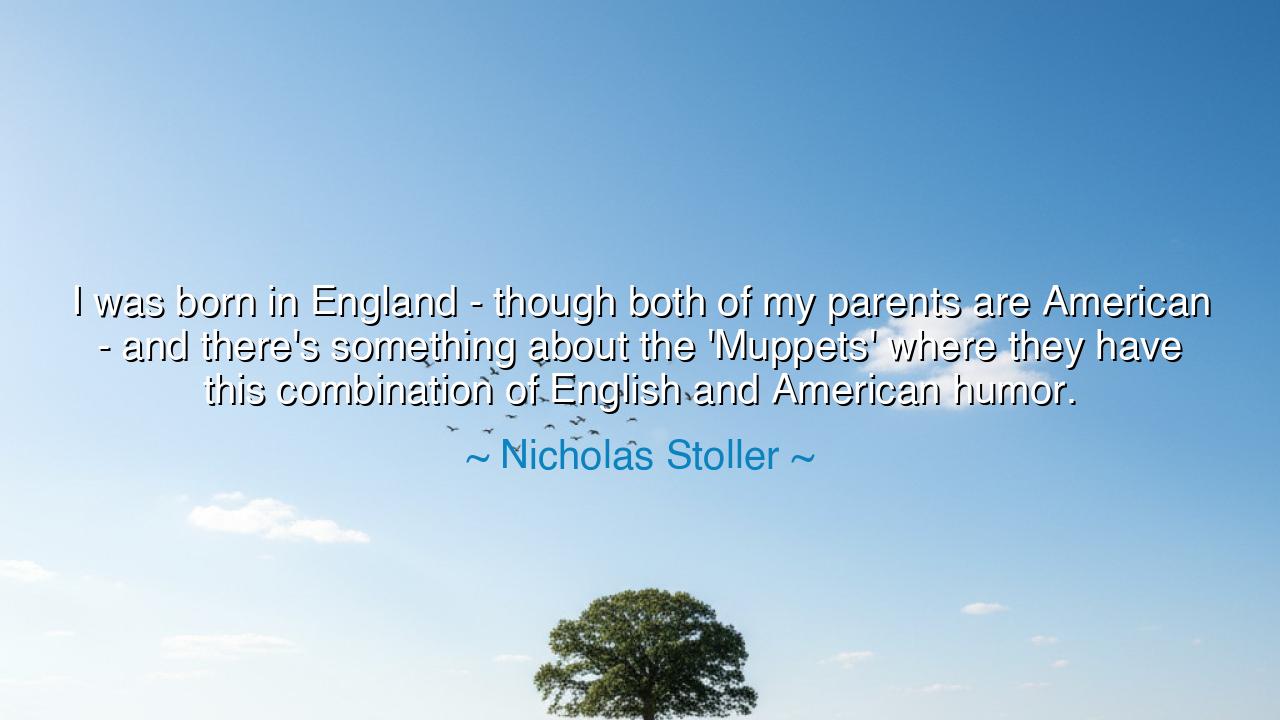
I was born in England - though both of my parents are American -
I was born in England - though both of my parents are American - and there's something about the 'Muppets' where they have this combination of English and American humor.






In the words of Nicholas Stoller, “I was born in England – though both of my parents are American – and there’s something about the ‘Muppets’ where they have this combination of English and American humor.”
These words, spoken lightly, carry within them a reflection on cultural harmony, humor, and the mysterious power of laughter to bridge worlds. Stoller, a creator of stories that make hearts both laugh and ache, recognizes in the Muppets something far deeper than children’s entertainment. He sees a meeting of two worlds — the wit of the English and the warmth of the American, the sharp satire of one and the boundless optimism of the other — woven together into a tapestry of shared humanity. In their laughter, the Muppets embody what so many cultures seek: unity without uniformity, diversity without division.
To understand the beauty of this union, one must first understand the spirit of English humor. It is subtle, dry, self-deprecating — a mirror that reflects the absurdity of existence with a knowing smile. It mocks the pompous, celebrates the awkward, and finds meaning in the mundane. English humor is the laughter of endurance, the quiet rebellion against life’s solemnity. In contrast, American humor bursts with boldness — expressive, heartfelt, and energetic. It seeks joy even amid chaos, believing that laughter is a birthright, not a privilege. Where the English smile wryly at life’s contradictions, the American laughs out loud, daring to hope. The genius of the Muppets lies in merging these two — the reflective and the exuberant — into one universal voice that speaks to all who still believe in kindness, creativity, and chaos.
The origin of this magical union traces back to the vision of Jim Henson, the quiet dreamer who gave felt and fabric a soul. Henson, an American, was deeply influenced by the British spirit when he brought his creation to England’s television studios in the 1970s. There, surrounded by the wry sensibilities of British performers and writers, he discovered the perfect balance: the show would not pander, nor would it preach. It would celebrate imperfection. The Muppets would fail, stumble, argue, and yet somehow keep singing. Their humor would hold both irony and innocence, cynicism and sincerity — a marriage of two nations’ hearts that transcended borders.
This blending of English and American humor is not merely comedic; it is philosophical. It reflects the eternal dance between intellect and emotion, between restraint and exuberance. The English remind us to laugh at ourselves, to take the sting out of pride, to survive through irony. The Americans remind us to laugh for joy, to dream without shame, to rise again with hope. In combining these, the Muppets became symbols of balance — creatures who could teach wisdom through foolishness, and hope through absurdity. They reveal that humor, at its highest form, is not cruelty nor escape, but understanding — a recognition that life is both ridiculous and miraculous at once.
Consider the story of Charlie Chaplin, born in London, who later found his art and his fame in America. Like Henson’s Muppets, Chaplin’s comedy was neither fully English nor fully American, but a perfect harmony of both. His tramp character — humble, awkward, and yet indomitable — carried English irony in his eyes and American optimism in his heart. When he stumbled, we laughed; when he rose, we wept. Chaplin’s laughter united continents because it carried the same truth that Stoller sees in the Muppets: that humor is the shared language of the human spirit, and when cultures meet through laughter, walls fall.
Thus, Stoller’s words are more than nostalgia — they are a reflection on the power of laughter to unify what is divided. In a world often torn by misunderstanding, humor reminds us that we are all foolish in our own ways — and that is our common bond. When English dryness meets American exuberance, we glimpse the wholeness of humanity: thought and feeling in harmony, critique and compassion entwined. The Muppets, in their playful absurdity, are sages disguised as puppets, reminding us that laughter can heal what logic cannot.
Let this, then, be the teaching: learn to find humor that bridges, not humor that divides. Laugh not at others, but with them. Seek the balance between irony and warmth, between cleverness and kindness. When you laugh, let it be both a mirror and a light — reflecting truth and illuminating hope. For humor, as Stoller and Henson understood, is not simply entertainment; it is a sacred act of connection, the most human of all arts.
And so, dear listener, remember the wisdom hidden in Nicholas Stoller’s words: “There’s something about the Muppets — this combination of English and American humor.” Cherish that combination within your own life — the humility to laugh at yourself, and the courage to laugh with the world. In that laughter lies understanding, and in understanding, the promise of peace. For when humor transcends borders, it ceases to be national — it becomes universal, eternal, and profoundly human.






AAdministratorAdministrator
Welcome, honored guests. Please leave a comment, we will respond soon